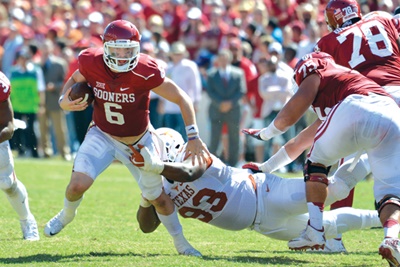ESPN and Fox used different approaches to the Big 12’s threat of expansion.
ESPN opted to restructure its deal, agreeing to pay the conference more money. Fox, on the other hand, took a harder line. It decided to stand pat as the Big 12 contemplated expanding its 10-school lineup.
 |
Texas and Oklahoma would not support Big 12 expansion.
Photo by: GETTY IMAGES
|
The result is that the Big 12 will see a little more money from ESPN — about $10 million total over the final eight years of the contract — in exchange for removing what the two sides are calling the “pro rata” clause. That’s the clause that forces the networks to pay a higher rights fee (a set amount per school) if the Big 12 expands. ESPN’s deal also comes with more advertising inventory in the games.
The pro rata clause remains in the Fox contract, meaning that if the Big 12 expands in the future Fox will owe the league more money based on the number of schools added. But under the current terms, Fox is not paying the league any additional money like ESPN did. ESPN’s media rights costs now are set for the deal, which originally was worth $2.6 billion over 13 years.
Separate from the expansion issue, the conference will realize about $240 million in additional revenue over the final eight years of its media deals, thanks to a new rights fee from the conference’s football championship that starts in 2017. ESPN reworked its deal in conjunction with negotiations for the Big 12’s championship game, which Fox and ESPN will split over the next eight years.
The specter of Big 12 expansion, which dominated headlines for the last three months, netted little more than a severe case of heartburn for the Big 12 and a heavy dose of heartache for the 11 schools that were finalists hoping for an invitation that never came.
But the Big 12’s dreams of making another $200 million to $250 million from expansion withered last week in Dallas, mainly because of pressure exerted by the networks, both of which staunchly opposed expansion — or at least the thought of paying extra for it.
Network executives complained that the schools being considered — BYU, Cincinnati, Houston and Connecticut, among others — would water down the power five league and not be worth the added media rights fees. While there were some Big 12 presidents reportedly in favor of adding two or four schools, the league’s most powerful members, Texas and Oklahoma, couldn’t be moved off the status quo.
Plus, by staying at 10 members, the Big 12’s schools will not have to share the new championship game revenue with any additional members.
“We don’t think expansion in the Big 12 is a good idea for the conference,” Fox Sports President Eric Shanks told a gathering of industry executives earlier this month at the NeuLion Sports Media & Technology conference. “We think it will be dilutive to the product in the short term. In the long term, it’s probably harmful to the future of the conference.”
The Big 12’s leadership apparently took those comments seriously. In the end, Big 12 presidents never even bothered to vote on the matter before announcing that expansion is off the table — for now, at least.
The Big 12 consulted with longtime media analyst Bevilacqua Helfant Ventures, as well as research firm Navigate Marketing.
The conference roundly was roasted for going through such an exhaustive process for nothing. But it still has the ability to expand at any point in the future. The difference is that expansion will not result in the financial windfall that school presidents were hoping to get, although Fox would still be on the hook for its share.
ESPN has a deeper relationship with the conference than Fox Sports. Though the two split the conference’s football rights, ESPN holds rights to the Big 12’s other sports and owns the Longhorn Network at the University of Texas.
Network sources believe the Big 12 is likely to remain intact for at least the next eight years, the length of the current TV contracts. The conference’s schools declined to extend their grant of rights beyond that.




